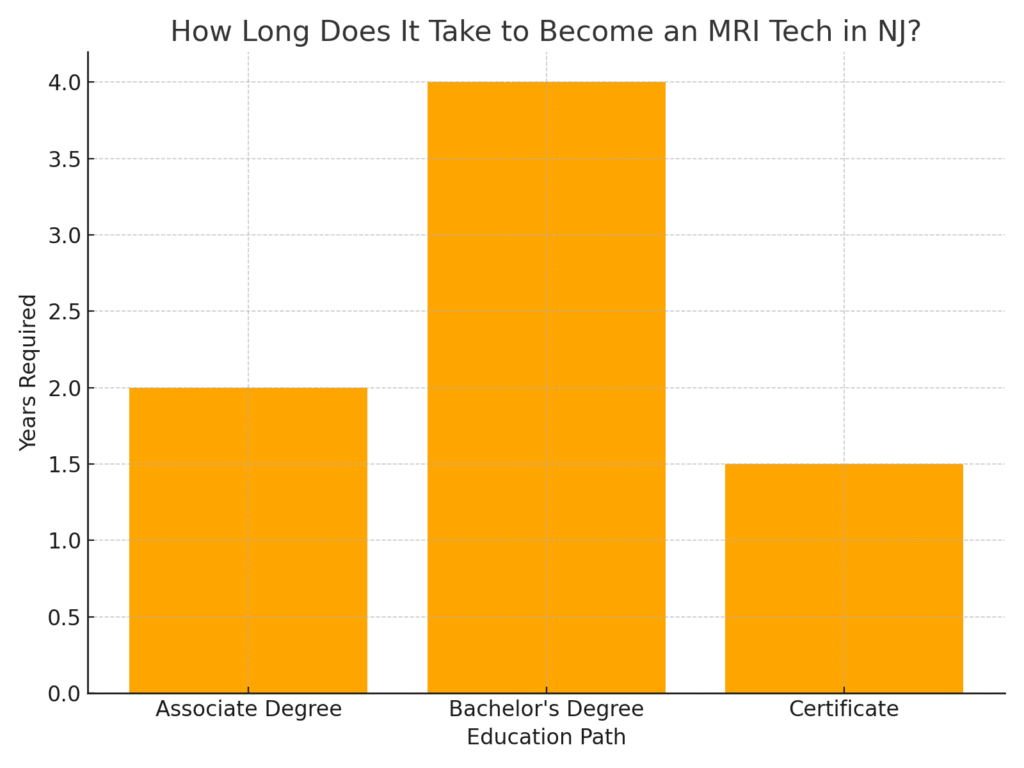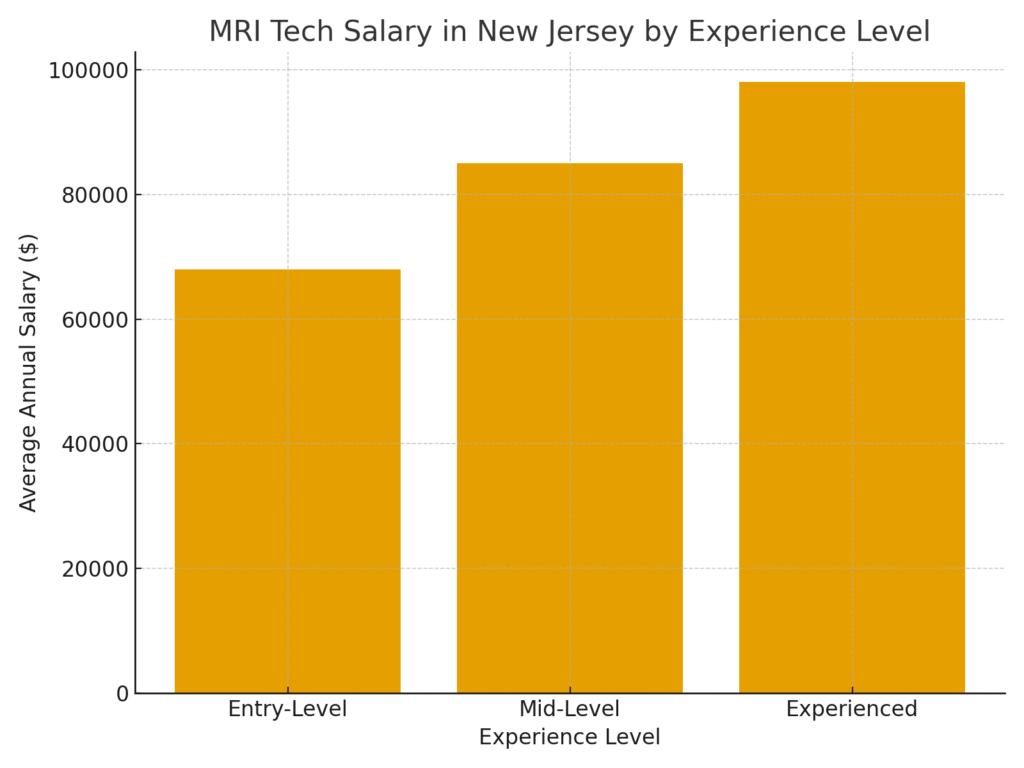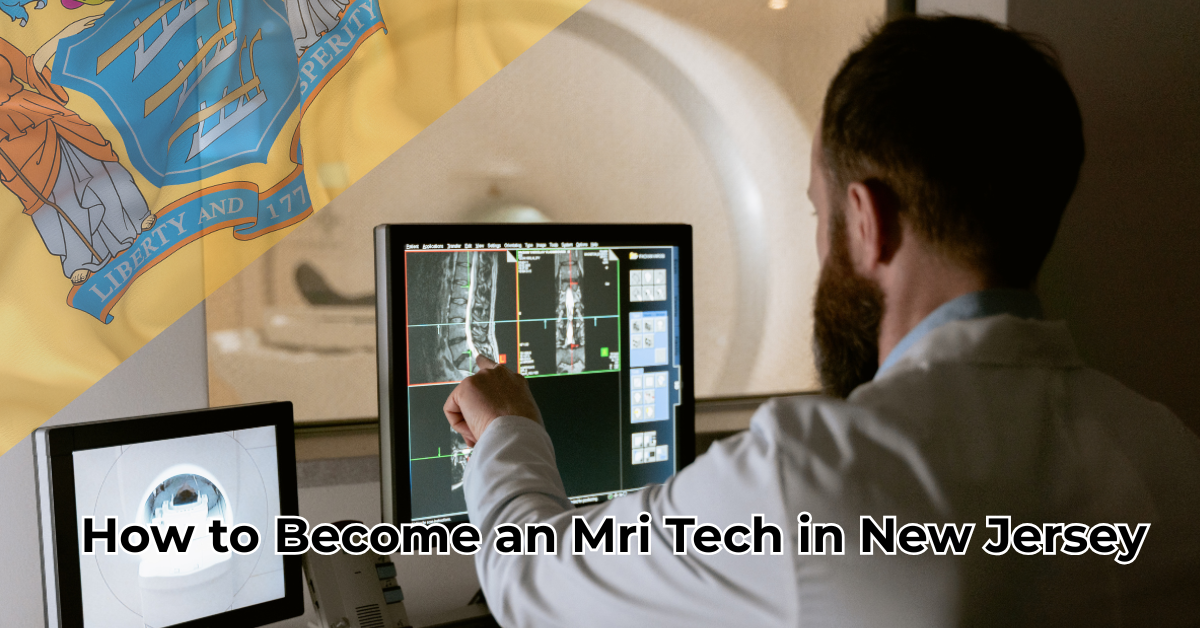One of the most rapidly evolving areas of healthcare is Magnetic Resonance Imaging (MRI), which provides a highly satisfying work opportunity to people who intend to change the lives of patients by working with the latest medical imaging devices.
The need for skilled MRI technologists is increasing in New Jersey with the growing number of hospitals, diagnostic centers and personal clinics expanding the number of imaging services they offer.
Being an MRI tech in New Jersey not only offers the benefit of a relatively stable and well-paying career, but it also offers chances of professional development, flexible working hours, and the possibility of being involved in innovative healthcare.
Being a beginner in your career or planning to change your field of activity to healthcare, becoming an MRI tech could be the most appropriate decision.
What Does an MRI Tech Do? Roles and Responsibilities
An MRI technologist, or MRI technologist, sometimes referred to as an MRI tech, is a highly skilled health care worker who operates the MRI machines to take images of the internal organs, tissues and structures of patients in detail. These images play a vital role in assisting doctors in the diagnosis of diseases like tumors, strokes, and musculoskeletal injuries.
MRI techs in New Jersey work closely with radiologists and physicians, ensuring the images they capture are clear and accurate. Their responsibilities typically include:
- Preparing patients for MRI procedures by explaining the process and addressing concerns.
- Positioning patients correctly to capture the best images.
- Operating MRI machines safely and effectively.
- Monitoring patients during scans to ensure comfort and safety.
- Maintaining detailed patient records and following strict healthcare protocols.
In addition to technical skills, MRI technologists must demonstrate empathy, strong communication, and attention to detail. Working with patients who may feel anxious or claustrophobic during the scan requires patience and professionalism—qualities that set great MRI techs apart from the rest.
Education Requirements: MRI Tech Schools in New Jersey
The right education is the first step to being an MRI tech in New Jersey. An associate degree in radiologic technology is the minimum requirement to secure a job with most employers, with a number seeking a bachelor’s degree at a higher level.
Upon the completion of a radiology program, students are normally subjected to advanced training in MRI technology.
New Jersey has a few approved MRI tech programs that will provide classroom training as well as clinical experience. These include programs in anatomy, patient care, radiation safety and MRI physics. Hospital and diagnostic center clinical rotations enable students to apply their knowledge in practice.
Gaining an accredited course is also essential in that it makes graduates eligible to take certification exams by various organizations, such as the American Registry of Radiologic Technologists (ARRT).
The New Jersey employers favor certified MRI technologists because the certification shows that they are competent, professional and committed to the profession.
Certification and Licensing: MRI Certification Requirements in NJ
After completing an accredited education program, the next critical step is obtaining certification and licensing. In New Jersey, most employers require MRI technologists to be certified by the American Registry of Radiologic Technologists (ARRT). To earn ARRT certification, candidates must:
- Graduate from an accredited MRI or radiologic technology program.
- Pass the ARRT certification exam in Magnetic Resonance Imaging.
- Commit to ongoing education and periodic renewal of credentials.
While New Jersey does not have a separate state-issued license specifically for MRI technologists, certification is often mandatory to secure employment.
Many healthcare facilities also prefer or require MRI techs to hold a New Jersey Radiologic Technologist License, especially if they began their careers as radiologic technologists before specializing in MRI.
Maintaining certification ensures that MRI technologists stay updated on safety standards, ethical practices, and new imaging technologies—making them more valuable in the job market.
Steps to Become an MRI Tech in New Jersey
Becoming an MRI technologist in New Jersey requires dedication, education, and certification. Here’s a step-by-step roadmap to guide you:
Earn a High School Diploma or GED
Subjects like math, physics, and biology form a strong foundation for future studies in medical imaging.
Complete an Accredited Radiology or MRI Program
Enroll in a college or technical school offering accredited programs in radiologic technology with MRI specialization. These typically take 2–4 years.
Gain Clinical Experience
Hands-on training through clinical rotations is essential. You’ll learn to operate MRI equipment, work with patients, and understand safety protocols.
Obtain ARRT Certification
After graduation, pass the ARRT MRI exam to demonstrate your professional competence.
Apply for Jobs in New Jersey Healthcare Facilities
Start with hospitals, imaging centers, or private practices. Entry-level positions allow you to build experience and advance your career.
Pursue Continuing Education
To maintain ARRT certification, MRI techs must complete ongoing educational credits. This helps you stay current with evolving technology and best practices.
Following these steps ensures you’re fully prepared to launch a successful and rewarding career as an MRI technologist in New Jersey.
How Long Does It Take to Become an MRI Tech in NJ?
The timeline to become an MRI technologist in New Jersey depends on the educational path you choose. On average, it takes two to four years to complete the process from start to finish.

- Associate Degree Path (2 years): Most students pursue an associate degree in radiologic technology, followed by MRI specialization. This is the fastest route to entering the workforce.
- Bachelor’s Degree Path (4 years): A bachelor’s degree offers more advanced training and may lead to leadership or teaching opportunities in the future.
- Certificate Programs (1–2 years): For individuals who already hold a degree in radiologic technology, some schools in New Jersey offer certificate programs focusing solely on MRI.
After completing education, add a few months to prepare for and pass the ARRT certification exam. Altogether, the journey usually takes about 2.5 to 4 years before you are fully qualified to work as an MRI tech in New Jersey.
MRI Tech Salary in New Jersey: What to Expect
One of the most attractive aspects of becoming an MRI technologist in New Jersey is the competitive salary. According to recent data, the average MRI tech salary in New Jersey ranges from $80,000 to $95,000 per year, depending on location, experience, and employer.
- Entry-Level MRI Techs: Around $65,000–$70,000 annually.
- Mid-Level MRI Techs (3–5 years of experience): $80,000–$90,000 annually.
- Experienced MRI Techs or Specialists: Over $95,000 annually, with some exceeding six figures in high-demand areas.
Urban areas such as Newark, Jersey City, and Trenton often pay higher salaries due to demand and cost of living, while smaller towns may offer slightly lower wages.

In addition to base pay, many MRI technologists in New Jersey receive benefits packages that include health insurance, retirement plans, paid vacation, and opportunities for overtime pay. With steady demand and high earning potential, this career provides both financial stability and professional satisfaction.
Best MRI Tech Programs in New Jersey
One of the most crucial moves toward becoming an MRI technologist is the choice of the school. New Jersey has a number of MRI tech-approved programs that blend classroom training with practical clinical training. The following are among the best opportunities that potential MRI techs can take into account:
- Rutgers School of Health Professions (Newark, NJ): Offers a comprehensive radiologic and imaging sciences program with MRI specialization.
- Bergen Community College (Paramus, NJ): Provides an accredited radiologic technology program that prepares students for advanced MRI certification.
- Essex County College (Newark, NJ): Known for strong clinical partnerships, giving students hands-on experience in hospitals and imaging centers.
- Union County College (Cranford, NJ): Offers radiography programs with pathways to specialize in MRI.
In selecting a program, ensure it is approved by the Joint Review Committee on Education in Radiologic Technology (JRCERT) or a well-known accrediting agency. Accreditation guarantees readiness to obtain ARRT certification and a better chance of getting a job upon graduating.
Job Outlook for MRI Technicians in New Jersey
The career outlook for MRI technologists in New Jersey is very promising. According to the US Bureau of Labor Statistics (BLS), employment for MRI techs is projected to grow by 6–8% through 2032, faster than the average for all occupations.
In New Jersey, growth is fueled by:
- An Aging Population: More patients require advanced imaging to diagnose age-related conditions.
- Expanding Healthcare Facilities: Hospitals, outpatient centers, and private practices are increasing their diagnostic imaging services.
- Technological Advancements: Innovations in MRI scanning create demand for skilled professionals who can operate advanced equipment.
This implies employment security and a lot of prospects for MRI technicians in the state. Urban centers such as Newark, Jersey City and Camden have especially high positions, but opportunities can be found across the healthcare network of New Jersey.
Final Thoughts
The profession of MRI technologist in New Jersey is a great career to pursue because it offers stability, growth, and the fulfillment that comes with serving patients by the means of high-technology medical imaging. It is a long process that needs dedication, beginning with the correct education, certification, and experience, but the benefits are well worth it.
MRI technology also provides financial stability and career satisfaction as it boasts of an average salary that is always ranked as one of the best in allied health professional jobs, job demands are high throughout the state of the US, and employees have a chance of career growth to supervisory or teaching positions.
This is the right time to start your journey, whether you are an enthusiast in the field of healthcare, technology as well as in taking care of patients. Through admission to one of the accredited MRI tech programs in New Jersey, ARRT certification, and lifelong learning, you can establish a long-term career in an ever-growing and growing field.
In short, if you’re ready to step into a career that combines cutting-edge technology with meaningful patient care, becoming an MRI tech in New Jersey could be your best decision yet.
FAQs
How do I become an MRI tech in NJ?
You need to complete an accredited radiology or MRI program, gain clinical experience, and pass the ARRT certification exam to work as an MRI technologist in New Jersey.
How much do MRI techs make in NJ?
On average, MRI techs in New Jersey earn between $80,000 and $95,000 per year, with higher salaries in major cities like Newark and Jersey City.
What is the fastest way to become an MRI tech?
The quickest path is earning an associate degree in radiologic technology with an MRI specialization, which typically takes about 2 years to complete.
How long does it take to become an MRI tech in NYC?
In New York City, it usually takes 2 to 4 years, depending on whether you choose an associate, bachelor’s, or certificate program, plus time to earn ARRT certification.

